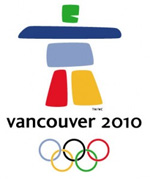 This time of year I find myself humming the Olympic anthem throughout the day. The Vancouver games run Feb. 12-28; it is time to start dreaming of mogul runs and bobsled victories. For some reason I hum the familiar tune associated with the games on my way to and from errands. As if hauling my three children around were an Olympic event in and of itself. I confess that my humming, on occasion, crosses over into the Star Wars theme music (also fitting for errands with kids -- makes sense as John Williams wrote them both).
This time of year I find myself humming the Olympic anthem throughout the day. The Vancouver games run Feb. 12-28; it is time to start dreaming of mogul runs and bobsled victories. For some reason I hum the familiar tune associated with the games on my way to and from errands. As if hauling my three children around were an Olympic event in and of itself. I confess that my humming, on occasion, crosses over into the Star Wars theme music (also fitting for errands with kids -- makes sense as John Williams wrote them both).
Just like the five colored rings that symbolize the games are all over everything, from our Visa cards to the McDonald's drive through, attempts at greening up corporate America are everywhere to be found today as well. Most recently, Coca-Cola has made efforts to green up the Vancouver games.
Not every corporate attempt can be trusted, but so far, kudos to Coca-Cola for their efforts. From hybrid delivery trucks and biodegradable beverage containers to furniture made from reclaimed Pine Beetle infested wood, Coca-Cola seems to be making a truthful attempt at greening the games that will hopefully serve as an outstanding example for such a global stage. You can catch a good article on these efforts here.
Coke has gone to great lengths to bring sustainability to the games. From bringing in recycling containers to reworking clothing options for the athletes carrying the torch, an undertaking like this is not without logistical challenges. For example, the goal was to have the athletes carrying the torch wear clothing made from recycled bottles, but the temperatures in Vancouver in the winter were lower than what the original clothing could manage, so the system had to be reworked. The same with their desire to use hybrid heavy-duty trucks, which, it turned out, were hard to get enough of for the games.
Coke also had to work with the City of Vancouver to rework the waste stream so the biodegradable materials actually end up in places where they will become compost material. The issues Coke faces in Vancouver, granted on a large scale, are not all that different from the challenges many of us ever-greening folks find each day. We are seeing with Coke the sort of system management and conflict that happen in a million ways each day for many of us.
For example, there is currently an ordinance in my community against composting. A few years ago a misguided neighbor started adding meat refuse to his compost pile. It went rancid and drew pests so the city put a ban on composting. In other places there are not recycling systems in place to haul away recyclable products. At our church, we hoped to brew fair trade coffee throughout the building, but the coffee equipment is owned by an outside company that will only allow us to brew its blend. To make a simple tweak like brewing fair trade coffee means revamping an entire system (which, in a church like mine that sees 2,000+ people each week, comes with a price tag of over $30,000).
So it will be interesting to keep an eye on Coke's progress at these games. And if they were indeed able to rework the system to meet their greening desires, then how can we do the same at home, in our communities, and on the smaller scales we work with each day? Keep a watch and learn!
 Tracey Bianchi blogs about finding a saner, greener life from the heart of the Chicago suburbs. She wrote Green Mama: The Guilt-Free Guide to Helping You and Your Kids Save the Planet
Tracey Bianchi blogs about finding a saner, greener life from the heart of the Chicago suburbs. She wrote Green Mama: The Guilt-Free Guide to Helping You and Your Kids Save the Planet (Zondervan 2009) and blogs at traceybianchi.com.
Got something to say about what you're reading? We value your feedback!